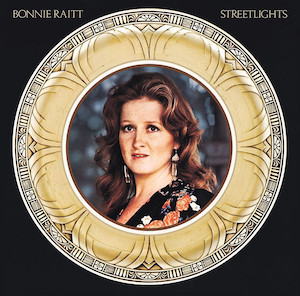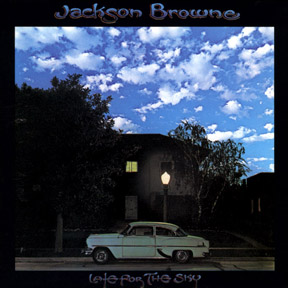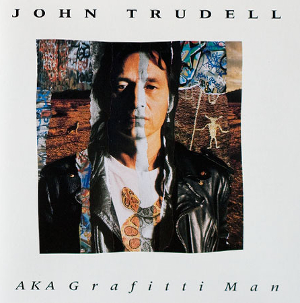Reception
Los Angeles Times critic Robert Hilburn said that "Fountain of Sorrow" "speaks of the perennial search for someone new – an effort that combines some renewed optimism with the lingering knowledge of past failures." [7]
In his 1974 Rolling Stone review of Late for the Sky , Stephen Holden wrote that the song "develops parallel themes of sex and nothingness, fantasy and realism, as Browne, looking at the photograph of a former lover, recalls:"
- When you see through love's illusion, there lies the danger
- And your perfect lover just looks like a perfect fool
- So you go running off in search of a perfect stranger
- While the loneliness seems to spring from your life
- Like a fountain from a pool...
"In the chorus, highly romanticized sexuality becomes a 'fountain of sorrow, fountain of light.' Later in the album the water images are developed into a larger metaphor for death and rebirth," wrote Holden. [8]
Robert Christgau called the song the best on the album: "I admit that the longest is also the best, an intricate extended metaphor called 'Fountain of Sorrow.'" [9] Cash Box said that Browne "uses his unique country-influenced balladry to his fullest about the highs and lows of love." [10]
In his 2008 book 1,000 Recordings to Hear Before You Die , Tom Moon wrote that Browne's lost seeker's "inquiry leads him into the minefields of memory" on "Fountain of Sorrow," in which "a photograph opens the floodgates".
Browne biographer Mark Bego called it "a beautiful and medium-paced ballad of lost love" that was Browne's "most masterful vocal performance to date." [11] Bego said that "it has a nice lively beat" and that Browne is "reminiscing instead of lamenting." [11] Bego says that in the lyrics, when the singer finds an old photograph in a drawer and remembers taking the picture, "he is finally able to put this failed relationship into perspective." [11]
Music critic Gil Asakawa called it the best song on "Late for the Sky", describing it as "fondly reflective" and saying that it "is typical of Browne's ability to make personal experiences seem universal." [12]
Glide critic Lee Zimmerman rated it as one of 10 Jackson Browne songs that should have been a hit. Zimmerman described it as "a brooding ballad and excellent example of Browne’s ability to draw on remorse and pathos" and said that "it offers enough optimism to ensure at least a semi-happy ending" but felt that "it may have been a bit too introspective to attain a wider reach." [13]

Clyde Jackson Browne is an American rock musician, singer, songwriter, and political activist who has sold over 18 million albums in the United States.

Jackson Browne is the debut album of American singer Jackson Browne, released in 1972. It peaked on the Billboard 200 chart at number 53. Two singles were released with "Doctor, My Eyes", which peaked at number 8 on the Pop Singles chart, and "Rock Me on the Water", which reached number 48.

For Everyman is the second album by American singer-songwriter Jackson Browne, released in 1973. The album peaked at number 43 on the Billboard 200 chart and the single "Redneck Friend" reached number 85 on the Billboard Hot 100 chart. In 2012, the album was ranked number 450 on Rolling Stone magazine's list of The 500 Greatest Albums of All Time.

Give It Up is the second studio album by American musician Bonnie Raitt. Released in 1972 by Warner Bros. Records, Give It Up is an amalgamation of various genres, including folk, blues, R&B, and soft rock. Seven of the ten tracks on the album are covers, and the tracks range from soft sentimental ballads to fast-paced folk rock pieces. Lyrically, Give It Up revolves around Raitt's femininity, relationships, and being comfortable with herself. Raitt recorded the album at Bearsville Studios with producer Michael Cuscuna.

Takin' My Time is the third studio album by American musician Bonnie Raitt. It was released in 1973 by Warner Bros. Records. The album is an amalgamation of several different genres, including blues, folk, jazz, New Orleans rhythm and blues, and calypso. The 10 tracks on the album are covers, ranging from soft sentimental ballads to upbeat, rhythmic-heavy tracks. Lowell George was originally hired to handle the production, but was ultimately replaced by John Hall when Raitt became unhappy with his production.

Streetlights is the fourth album by Bonnie Raitt, released in 1974.

World in Motion is the ninth album by American singer-songwriter Jackson Browne, released in 1989. It peaked at number 45 on The Billboard 200 and was Browne's first album to obtain neither gold nor platinum status. The album took three years to complete and makes statements about nuclear disarmament and the "secret" government that brought forth Oliver North and the Iran-Contra scandal.

I'm Alive is the tenth album by American singer-songwriter Jackson Browne, released in 1993. The title track, "I'm Alive", reached No. 18 on the Album Rock Tracks chart and No. 28 on the Adult Contemporary chart. Other singles released from the album were "Everywhere I Go" and "Sky Blue and Black".

Diamonds & Rust is the sixteenth studio album by American singer-songwriter Joan Baez, released in 1975. The album covered songs written or played by Bob Dylan, Stevie Wonder, The Allman Brothers, Jackson Browne and John Prine. Diamonds & Rust, however, also contains a number of her own compositions, including the title track, a distinctive song written about Bob Dylan, which has been covered by various other artists.

"Hot Blooded" is a song by the British-American rock band Foreigner, from their second studio album Double Vision. It was released as a single in June 1978 and reached #3 on the Billboard Hot 100 chart that September. The single was also certified Platinum by the Recording Industry Association of America. It is also the theme song to the truTV scripted series Tacoma FD.

"James Dean" is a song written by Don Henley, Glenn Frey, Jackson Browne, and JD Souther, and recorded by the American rock band Eagles for their 1974 album On the Border. It was the second single released from this album, reaching number 77 on the U.S. pop singles chart.

Late for the Sky is the third studio album by American singer–songwriter Jackson Browne, released by Asylum Records on September 13, 1974. It peaked at number 14 on Billboard's Pop Albums chart.
The Ash Grove was a folk music club located at 8162 Melrose Avenue in Los Angeles, California, United States, founded in 1958 by Ed Pearl and named after the Welsh folk song, "The Ash Grove."

"Boulevard" is a song written and performed by American singer-songwriter Jackson Browne. It is from his 1980 album Hold Out. When it was released as a single, it entered the Billboard Hot 100 chart at position number 72 on July 5, 1980. It peaked at number 19 and spent 16 weeks on the chart, the fifth-biggest hit of Browne's Top 40 career. Besides the United States, the song was also released as a single in Spain, Japan, the U.K., Italy and Germany. In Canada, "Boulevard" reached number four.

"You Love the Thunder" is a song written and performed by American singer-songwriter Jackson Browne from his 1977 live album, Running on Empty, recorded at a concert at Garden State Arts Center in Holmdel, New Jersey, on September 6, 1977. Released as the third single a full year after the album came out, it only reached #109 on Billboards Bubbling Under Hot 100 Singles chart, though it received increased Album-Oriented Rock airplay. The B-side of the U.S. single was "The Road"; however, the B-side for the British single was "Cocaine".
"Jamaica Say You Will" is a song written and performed by American singer-songwriter Jackson Browne. It is the first song on his 1972 self-titled debut album.

"Walking Slow" is a song written and performed by American singer-songwriter Jackson Browne, released as the initial single from his 1974 classic album, Late for the Sky, however, the single failed to chart. It was also released as a promotional single in the United Kingdom.
"Scandinavian Skies" is a song written by Billy Joel that was first released on his 1982 album The Nylon Curtain. Commentators have noted its Beatle-esque elements and obscure lyrics. Joel has stated that the song was inspired by an experience with heroin. Although not released as a single, it reached #38 on Billboard's Mainstream Rock chart.

AKA Grafitti Man is an album by the Native American musician John Trudell, released in 1992. The songs, parts of which were rerecorded, first appeared on four cassettes Trudell made in the 1980s and early 1990s. The aka Grafitti Man cassette, recorded with Jesse Ed Davis in 1986, was called the best album of the year by Bob Dylan. Trudell supported the album by touring with his band, the Grafitti Man Band.
"Late for the Sky" is a song written by Jackson Browne. It is the opening track and title track from Browne's 1974 album Late for the Sky.















